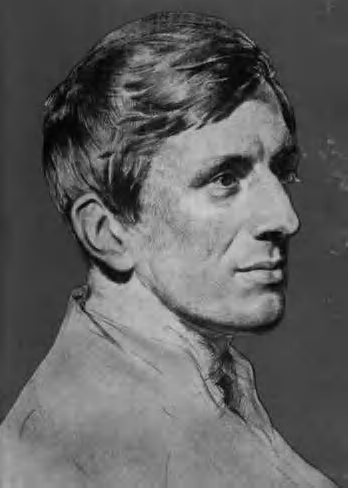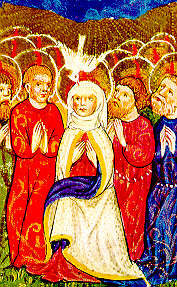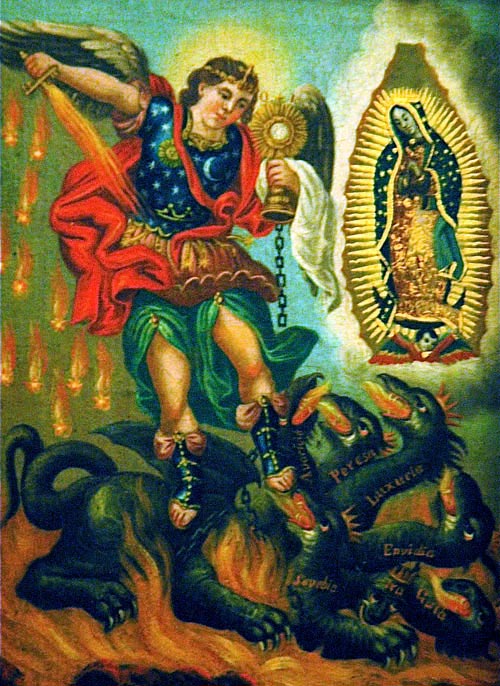I love these first lines from the
Chapter 20 of the Book of
Revelation; ďI John, saw an angel
come down from heaven, holding in
his hand the key to the abyss and a
heavy chain. He seized the dragon,
the ancient serpent which is the
devil or Satan, and tied it up for a
thousand years and threw it into the
abyss, which he locked over it and
sealed so it could no longer lead
the nations astray.Ē
The angel, spoken of here is
commonly held to be Saint Michael,
and in fact, if you look at very old
statues of Saint Michaelóweíre all
familiar with the contemporary
one--Saint Michael standing over the
dragon, one foot on the devilís
head, sword poised over his head,
ready to strike the death blow. But
the older depictions of Saint
Michael are very much influenced by
this passage from Revelation. Itís
almost the same, but with some
notable differences. First, Saint
Michaelís foot is not on the devilís
head pressing him down, rather Saint
Michael is straddling the lower half
of Satan, sword poised in the same
position, but in his other hand heís
holding a chain thatís attached to a
large iron collar around the devilís
neck, and heís pulling back on it,
as the devil holds himself off the
ground with one hand, and has the
other hand pulling on the collar
trying to free himself.
So in contemporary depictions, Saint
Michaelís foot is pressing down on
Satanís head showing him whereís
heís going. In the older depictions,
heís pulling back on the devilís
neck, forcing him to look up at what
heís lost. And in the older
depictions, around Saint Michaelís
belt is a metal ring with a key on
it, to lock the abyss thatís spoken
of here.
And different theologians and
different faith traditions bat back
and forth what John means here. Is
he speaking literally or
metaphorically? To me, none of that
is really important. What is
important then?
Important detail number one, we win
the fight in the end so hang in
there.
Important detail number two, God
hasnít left us to fight this fight
alone. We have allies. Our first
ally is the Church, specifically the
teachings and prayers of the
Church. The teachings of the Church
protect us from going astray. Much
like the key that is mentioned
here.
What do keys do? They keep things
in or they keep things out. They
lock and unlock. The last time we
heard a reference to keys is when
Peter is given the keys to the
kingdom by Jesus after Peter
professes that Jesus is the Messiah.
So who is Peter? Our first Pope.
The one entrusted with the teaching
of Christ. So the teachings of the
Church unlock the mysteries of God
for us so we can better understand
and have a relationship with this
savior we profess to believe in, and
they help lock out temptation, by
warning us of danger.
Our second ally is the body and
blood of Christ. The sacraments.
What do the sacraments give us?
Freedom. The sacraments break the
bonds of sin the devil uses to hold
us captive, and at the same time,
bind HIM, and render HIM powerless,
much like an iron collar and chain
would. (You begin to see why I like
the old statue better, it was far
more theological.)
And our third allies are the angels
themselves. Iíve often said on the
feast of the guardian angels, they
are the most underused weapon in the
arsenal God has given us. All
through Revelation weíve seen angels
worshipping, doling out punishments,
and carrying out fierce battles with
the evil one. They follow Godís
every command, and God has commanded
them to protect us. Their vocation
is to assist us in our vocation.
And thatís important detail number
three. Weíve been seeing a lot of
the archangel Michael, throughout
Revelation, and weíll be seeing a
lot of Gabriel during Advent. The
name ďMichaelĒ means, Godís
strength. ďGabriel,Ē Godís message.
And ďRaphael,Ē Godís healing. Our
common vocation is to mimic theirs.
We must now be Gabrielís, and bring
Godís message to others through
witness. We must now be Raphaelís
and bring Godís healing through our
charity (forgive). And we must now
be Michaelís, and defend our faith
in word and deed.
And blessed be God
forever!
--Father Michael Anthony Sisco
(November 2008)



